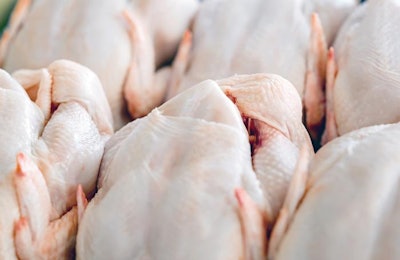
As the United Kingdom prepares to leave the European Union under Brexit, increased trade with other partners is a top priority. One of the stumbling blocks to free trade to emerge between the U.K. and the U.S. in exploratory talks in Washington, D.C., this week involves the humble chicken; specifically, whether chlorine-washed chicken from the U.S. can be imported into Britain. This trade is currently banned under EU regulations.
A recent speech from Michael Gove, Britain’s Secretary of State for environment, food and rural affairs highlighted his commitment to maintaining the country’s high animal welfare standards and developing higher global standards.
Meanwhile, in Washington, D.C., this week, Liam Fox, Britain’s Secretary of State for international trade and president of the board of trade has made it clear that agriculture should be included in the free trade discussions.
BBC reports that Fox “downplayed” the issue of chlorine-washed chicken as a cause of disagreement between the countries.
UK farming minister opposes chlorine washing
Free trade deals are based on the mutual acceptance of the other partner’s standards.
In March, the farming minister for the UK government, George Eustice, highlighted the differences in chicken production standards in the U.S.
“It [the U.S.] has lower standards of animal welfare and lower standards of food safety, and it allows approaches that are not currently allowed in the European Union, such as chlorine washes,” he said. “It is important, as we contemplate any future trade deal, that we do not put our industry at an unfair disadvantage.”
British Poultry Council leader says compromising standards will not be tolerated
According to a statement from the British Poultry Council, the organization also rejects the notion of importing chlorine-washed chicken as part of a makeweight in trade negotiations with the U.S. With production costs lower in the U.S., the council said poultry producers fear that free trade would damage their business.
“The UK Poultry meat industry stands committed to feeding the nation with nutritious food and any compromise on standards will not be tolerated. A secure post-Brexit deal must be about Britain’s future food security and safety. This is a matter of our reputation on the global stage,” said Richard Griffiths, chief executive, British Poultry Council.
“It’s not just about farming safe and affordable food but also about the British values that go into producing it. What we need to be doing is carry on investing in improving efficiency and productivity so that we get better at feeding ourselves and uphold the values that we hold dear,” he said.
















